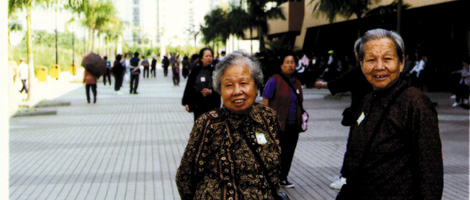 Flying colours at sunset
Flying colours at sunsetOld age can be fruitful



 Flying colours at sunset
Flying colours at sunset
Old age can be fruitful
By Teresa Fung
Ms Lau Yau Yi, 77, like many elderly people now, chooses to remain in the work force after retirement. Statistics released from the Report of the Working Group on Care for the Elderly in 1994 show that 50 percent of some 82,000 elderly people in Hong Kong are still at work.
Most of them are engaged in fundamental occupations and service work, such as being guards, hawkers and servants.
Many of them seek jobs for money after retirement.
Mr. Cheung Man Chuen, 78, the chairman of the Retired Persons’ Association of St. James’ Resettlement, said, “The cost of living is rising. The elderly can hardly live solely on public financial assistance.”
At present, two types of government financial assistance are provided to the elderly.
The first type is the pension from the Comprehensive Social Security Assistance Scheme.
About one-tenth of the elderly in Hong Kong receive about $1,800 per month under the scheme. The basic requirement is that they be unemployed.
Another type of public assistance is the Old Age Allowance. All elderly aged 70 or over are eligible to receive $595 each month.
A lower rate, $525, is payable to those aged between 65 and 69. Their monthly income should not exceed $4,140, and total assets should not exceed $141,000.
Aside from the economic reasons, there are other factors why old people are still at work. They treasure the chance to socialize with the younger generation, for example.
“Surrounded by these energetic young colleagues, I feel that I am much younger,” Ms Lau said.
The elderly people are welcomed by many employers. An official in the Social Welfare Department said that many organizations employ them in order to minimise operating costs.
However, Ms Lau said it is her rich experience that gained her the trust she has earned from her employer.
Said she: “A few years ago, the owner moved part of the production line to China. All of the employees who were fired were younger than me.”
At present, she is responsible for teaching newcomers the skills of packaging watches. “I receive much respect from my colleagues,” she said.
However, with the escalating unemployment rate, finding a job is not easy for an elderly prospective employee.
Therefore, the government has subsidized an Employee Retraining Scheme. The scheme is organized by the Employment Service of Hong Kong Council of Service. This scheme equips the elderly with advanced skills.
The courses are free of charge. Participants can even receive an average of $142 per day as an incentive to work harder.
The scheme has also set up a marketing team to persuade company owners to recruit the aged. About 70 percent of the trainees are eventually employed.
The senior employing and training officer of the retrain scheme, Mr. Simon Ng, said, “This proves that the older workers are accepted.”
Although they are employed, some elderly workers are not satisfied with their jobs.
As newcomers to certain production processes and services, they have to take time to adapt to the new working environments.
Mr. Ng said, “For instance, the elderly need time to learn computer skills.”
Besides, some old workers are dissatisfied with their low wages.
Said Mr. Ng: “They receive lower wages than before. But they have to work for longer hours in poorer working conditions.”
Not all elderly working people are in it for the money, however. While some elderly people devote themselves to wage-earning careers, others become voluntary workers.
Some of them are volunteers in hospitals, residential homes, churches and welfare organizations.
They participate actively in services such as visiting patients and looking after single elderly people and the disabled.
Elderly volunteers say they gain much from this. For example, their social circles expand through these activities.
Mr. Tang Che Woon, 62, the vice-chair of the Sha Tin Inhabitants Association, said, “We feel less isolated from society. We are acquainted with people from all walks of life, even with drug abusers.”
Besides, their psychological health is maintained. “It is these activities that force our brains to work,” said Mr. Tang.
There are other rewards as well.
Mr. Tang received a service award from Governor Chris Patten. He said, “This assures me that I am still useful in society.”
Sometimes, deteriorating health and opposition from family members deter the elderly from being active in society.
Yet, they all claimed that it is worth overcoming the obstacles.
“A busy life is more suitable for me,” Mr. Cheung said. “I’ll continue to work as long as I can.”
